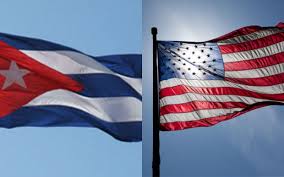The U.S. and Cuba reopened embassies in each other’s nations on Monday for the first time in 54 years, but people in both countries are waiting for a day when Congress repeals the decades-long embargo on trade.
Businesses like Airbnb, MasterCard and Netflix have established a presence in Cuba to prepare for when the U.S. allows businesses to trade freely with the island, but it remains to be seen when that might happen. Senate Majority Leader Mitch McConnell, R-K.Y., an opponent of normalizing relations with the Communist country, has vowed to block attempts to lift the trade embargo and to appoint a U.S. ambassador. A limited number of business sectors, including pharmaceuticals, agriculture and telecom, can gain exemptions to invest in Cuba, despite the embargo.
U.S., Cuba Restore Full Diplomatic Ties After 5 Decades
Limits on tourism remain, but Americans can already take government-sanctioned trips to the island, and an estimated 100,000 have traveled to Cuba in recent years, according to the Obama administration. Cuba hosts approximately 3 million total foreign visitors each year, most of them from Canada and Western Europe, according to Freedom House, a civil liberties advocacy group.
Some U.S. lawmakers see the reopening of relations as a chance to help Cuba’s 11 million citizens assert their human rights, including by helping boost their access to the Internet. Such access in recent years has enabled people in repressive nations like Iran, Egypt and Tunisia to criticize their leaders, organize protests and sometimes topple unpopular governments through public pressure.
Secretary of State John Kerry and Cuban Foreign Minister Bruno Eduardo Rodriguez Parilla spoke to reporters on Monday at the State Department, each noting there would continue to be differences on subjects like human rights and adding that normalizing full trade and diplomatic relations could take years. President Barack Obama supports lifting the U.S. trade embargo against Cuba, but Kerry added that reopening embassies is only a step toward building support for resuming trade relations.
“I can assure the world, including the people of Cuba, that the U.S. will do its part,” Kerry said of the negotiations process. “We would hope that people would begin to see the benefits that are emerging in both countries from normalizing relations.”
Rep. Kevin Cramer, R-N.D., and Rep. Peter Welch, D-Vt., on Monday announced they will introduce the Cuba DATA Act, a bill that would enable U.S. telecommunications and Internet firms to offer more services in Cuba. Sen. Tom Udall, D- N.M., has introduced a similar bill in the Senate. Only 26 percent of Cubans have basic Internet access, and less than 5 percent of Cubans have an unrestricted, broadband speed access to the global Internet according to Freedom House.
“Not only would our telecommunications companies have the opportunity to upgrade Cuba’s infrastructure, but our farmers and entrepreneurs would be able to conduct business in Cuba utilizing 21st century communication methods,” Cramer said in a press release.
American investment will also have to make computers and Internet access less expensive for any cultural shift to take place. An average computer in Cuba could cost around $700, and online access at a hotel or cafe may cost $12 per hour – which is far too expensive for the $20 monthly salary made by the average Cuban, according to Freedom House.
Grievances persist despite start of new era in US-Cuba ties
Cuba won’t suddenly have a renaissance of human rights and free trade if the U.S. lifts the embargo, as the island has maintained full economical, political and diplomatic relations with the rest of the world since 1961, says Carlos Ponce, director for Latin America programs at Freedom House.
He says a stagnant economy under Cuban President Raul Castro and his brother, former President Fidel Castro, are what have kept the island inhabitants using decades-old products.
“We cannot attribute to the embargo the inefficiencies of the failed dictatorship,” Ponce says. “The lack of infrastructure, terrible finances, economic stagnation and crisis is only the Castro brothers’ and their followers’ fault.”






